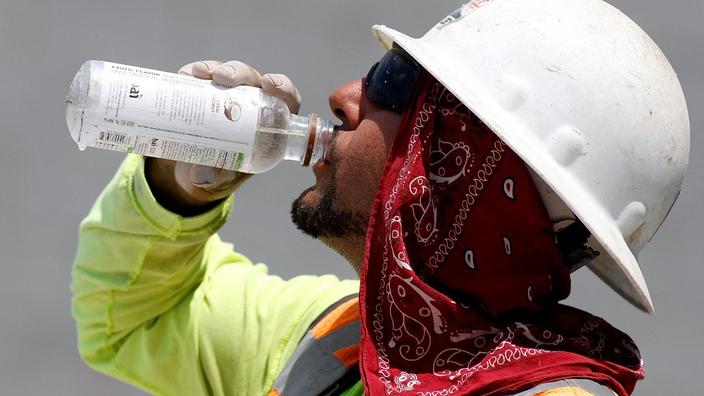“
The heat of the climate can be so excessive that the body will be absolutely powerless there.
For then, the abatement will pass to the very mind;
no curiosity, no noble enterprise, no generous feeling;
all inclinations will be passive;
laziness will bring happiness there.
The heat wave which affects the country should not inflect the mores of the French to the point of creating a real geographic determinism as theorized by Montesquieu in
De esprit des Lois
.
But it will cause productivity losses as workers' organizations are put to the test.
Read also: Heatwave: how to protect your pets from the heat?
Above 25 degrees, productivity losses
“
From 24-25 degrees, physiological studies show that it is too hot to work at a normal pace
,” explains Catherine Saget, researcher at the International Labor Organization (ILO), and co-author of a 2019 study on the impact of heat stress on labor productivity. Beyond that, the productivity losses are more or less important according to the activity concerned: the professions requiring a physical investment are the most affected. In the construction sector, productivity losses hover between 30 and 40% around 30 degrees, and approach 100% when the mercury rises to 40 degrees.
As for office workers who do not have access to air conditioning, the productivity losses, although less, remain significant.
Despite the lack of recent studies on this subject, the University of Helsinki attempted a synthesis in 2006, bringing together 24 existing studies on call centers.
On average, productivity losses 6 to 10% are observed by 30 degrees in the room, from 12 to 21% by 35 degrees.
In particular, the voice flow and the ability of employees to chain calls were measured.
The study also notes that the ideal temperature in the premises for working is 21.75 degrees!
Read also: "Occupational physicians have a role of alert and safeguards"
Take into account the feelings of employees
The National Research and Safety Institute (INRS), specializing in research on occupational health, also notes that, “
above 30 ° C for sedentary activity, and 28 ° for work requiring physical activity , the heat can constitute a risk for the employees.
However, the French Labor Code does not explicitly allow one to dispense with face-to-face work because of the heat. With a subtlety, since the employer is required to avoid "
exaggerated temperature rises
" on the premises of the company. And in the event of non-compliance, likely to cause "
serious and imminent danger
" for the employee, the latter can assert a right of withdrawal.
For its part, the INRS draws up a list of advice.
To avoid fatigue, headaches and dehydration, it is advisable in particular to adapt the working hours, so as not to be exposed to the hottest hours for outdoor jobs, and to take more breaks, preferably in cool places. .
“
Companies must take into account the subjective symptoms of employees, their feelings
, adds Gérard Lucas president CNPMT, the union of occupational physicians.
You have to trust your employees and accept that not everyone has the same resistance to heat.
"
Read also: "I do not want to return to the office": these employees desperate to stay telework
Billions for the economy
These episodes of climate stress come at a cost to the economy. The ILO estimates that in 2030, 2.2% of working hours in the world will be lost under the effect of heat stress, reinforced by the increase in the global average temperature of 1.5 degrees, low forecast climate experts. This loss will be twice as large as in 1995 and will amount to destroying an economy the size of the United Kingdom every year. Developed countries are much less affected, but the study notes, however, that while "
the rise in temperatures should not have significant consequences for the productivity of workers in the region, the increase in extreme weather events could
."






